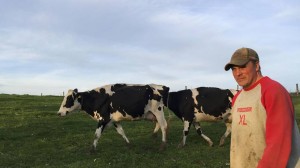The milk war: How a letter in Wisconsin set off a trade dispute between Canada & the US
< < Go Back
The dairy sector has become central to a new dispute between Canada and the United States, but the contention began with the plight of a few American families.
Just seven days remain until Steve and Dori Lichty’s dream collapses.
On May 1, the truck that picks up the milk from their small dairy farm will stop coming. For a few days at most, they will keep milking their cows, hoping to buy time. But then it will be over. They will call other farms, trying to divide up and sell their cows, and failing that, send them to a stockyard for slaughter. In his mind, Mr. Lichty pictures the cows walking out of his barn for the last time and does not know how he will handle it.
The story of how milk emerged as a flashpoint in a new war of words between the United States and Canada starts with the plight of families such as the Lichtys, whose livelihood now hangs in the balance. Earlier this month, Mr. Lichty walked down the long driveway to his mailbox, where he found a one-page letter from the dairy processor that buys the farm’s milk. The letter, delivered to nearly 60 Wisconsin dairy farms, said that as a result of a decision by the Canadian government, the processor could no longer buy their milk.
That letter set off a chain of events that led all the way to the President of the United States, who happened to visit Wisconsin on April 18. The dairy dispute has caught Donald Trump’s attention: Over the past week, he has repeatedly decried Canadian policy. In an interview on Friday with the Associated Press, Mr. Trump said dairy farmers in Wisconsin and New York are “getting killed” by the North American free-trade agreement.
Mr. Trump’s remarks during his visit to the state were the culmination of weeks of intense effort involving local farmers, dairy-industry officials and state elected representatives. Wisconsin, a small state where the license plates read “America’s Dairyland,” is in an unusually good position to make its case heard. It was crucial to Mr. Trump’s narrow election victory in November. Mr. Trump’s Chief of Staff, Reince Priebus, grew up in Wisconsin, as did Paul Ryan, the Speaker of the U.S. House of Representatives.
At the heart of the current conflict are Canadian rules governing the dairy industry. Provincial milk marketing boards are introducing a new classification for a type of milk concentrate used to make cheese, which gives companies an incentive to buy the domestic version rather than use imports from the United States. In a report issued in March, the office of the U.S. Trade Representative said that it had communicated its “serious concerns” with the policy changes to the Canadian government and the World Trade Organization.
The story might have remained a relatively obscure trade tension were it not for two factors: the abrupt move by Grassland Dairy Products, a Wisconsin processor, to drop dozens of dairy suppliers, and the flush state of the Wisconsin dairy supply. In the letter dated April 1, Grassland said that it had suffered a “severe loss” of business due to regulatory changes in Canada and was “forced to cut back on our milk intake volumes on a very short notice.” A Grassland spokesperson did not respond to a request for comment.
For the farms that received the letter – 58 in Wisconsin and nine in Minnesota – it came like a bolt out of the blue. None of the farmers had even heard of the classification issue. Now, they had to scramble to find a new processor with 30 days’ notice during the spring milking season, when production is at its peak. In the past, getting a new processor was not a major hurdle. But as farmers such as Mr. Lichty began frantically calling around the state this month, they kept getting the same answer: We’re already at capacity and can’t take any more milk.
“We appreciate that [Canada] is trying to protect its own, but it couldn’t have come at a worse time,” Dori Lichty said as she surveyed the family’s herd of several dozen cows on a recent evening. “We have an oversupply of milk in the U.S., and especially in Wisconsin.” The 23 major dairy states produced 17.5 billion pounds of milk in March, a record.
John Pagel, president of the Dairy Business Milk Marketing Cooperative, said 21 of the impacted 58 Wisconsin farms have found new buyers for their milk. His group is working against the clock to find help for the others, such as the Lichtys.
More From The Globe & Mail:





